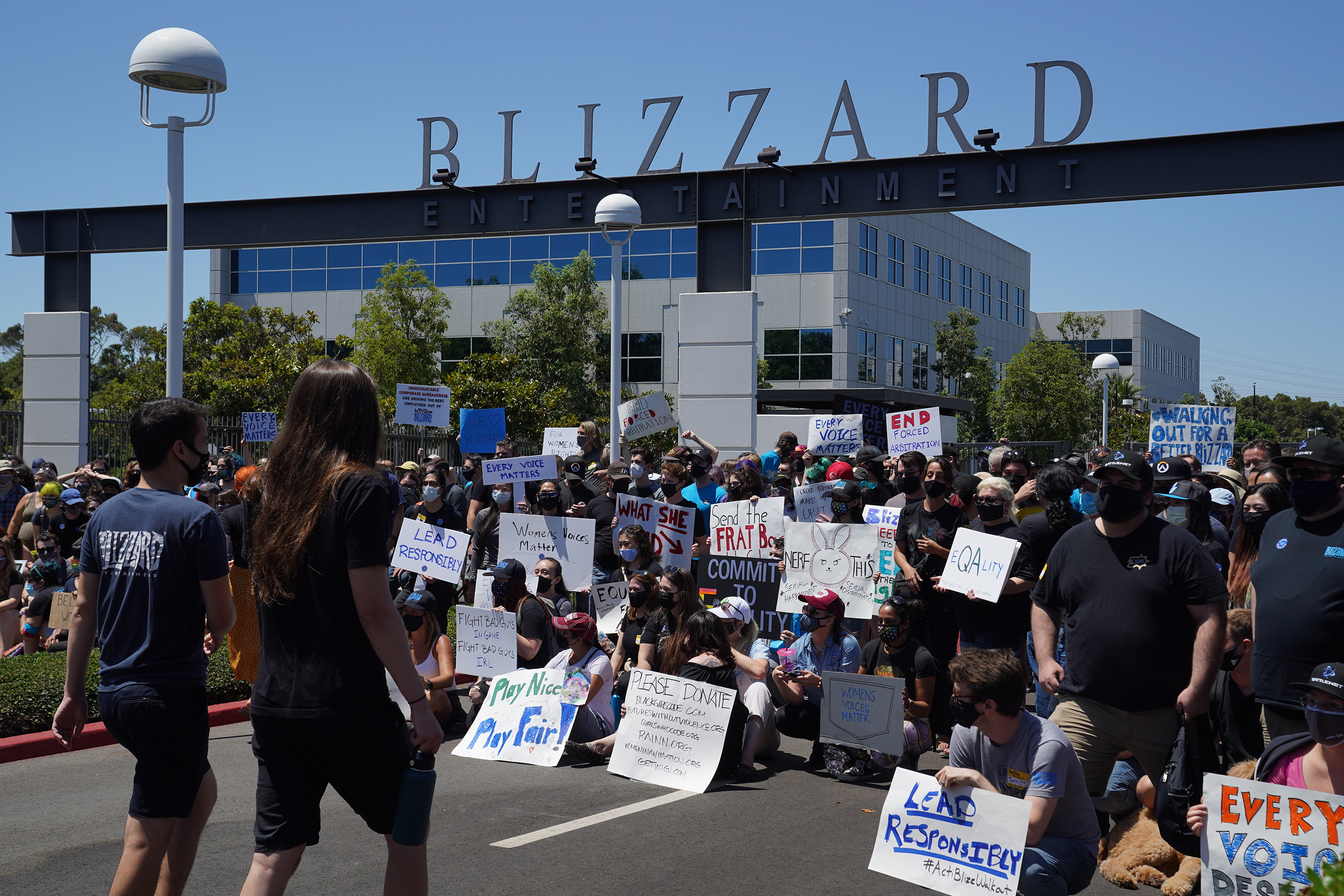More shocking Activision Blizzard revelations: Bobby Kotick once told an assistant he was going to have her killed
A new report in the Wall Street Journal paints an unflattering picture of Activision-Blizzard

Keep up to date with the most important stories and the best deals, as picked by the PC Gamer team.
You are now subscribed
Your newsletter sign-up was successful
Want to add more newsletters?

Every Friday
GamesRadar+
Your weekly update on everything you could ever want to know about the games you already love, games we know you're going to love in the near future, and tales from the communities that surround them.

Every Thursday
GTA 6 O'clock
Our special GTA 6 newsletter, with breaking news, insider info, and rumor analysis from the award-winning GTA 6 O'clock experts.

Every Friday
Knowledge
From the creators of Edge: A weekly videogame industry newsletter with analysis from expert writers, guidance from professionals, and insight into what's on the horizon.

Every Thursday
The Setup
Hardware nerds unite, sign up to our free tech newsletter for a weekly digest of the hottest new tech, the latest gadgets on the test bench, and much more.

Every Wednesday
Switch 2 Spotlight
Sign up to our new Switch 2 newsletter, where we bring you the latest talking points on Nintendo's new console each week, bring you up to date on the news, and recommend what games to play.

Every Saturday
The Watchlist
Subscribe for a weekly digest of the movie and TV news that matters, direct to your inbox. From first-look trailers, interviews, reviews and explainers, we've got you covered.

Once a month
SFX
Get sneak previews, exclusive competitions and details of special events each month!
A new report in the Wall Street Journal details further incidents of harassment and sexual harassment at Activision-Blizzard, some dating back to 2006. The report, which Activision characterized as "inaccurate" in its own statement today, details Jen Oneal's short reign as Blizzard co-head, and why she left, and also includes allegations about CEO Bobby Kotick's own behaviour and how the company's leadership has historically responded to such issues.
Jen Oneal was promoted to co-head of Blizzard in August 2021, making her the first woman to lead one of Activision's business units. This was widely seen as a positive step for Blizzard amidst these grim allegations and ugliness. A few months later Oneal has come out as someone who has experienced this harassment herself, and announced her intention to leave: This is simply staggering.
In September 2021 Oneal emailed an Activision lawyer to announce her intent to resign, saying "it was clear that the company would never prioritize our people the right way", alleging she had been sexually harassed earlier in her career at Activision, and that she was paid less than her male co-head Mike Ybarra. "I have been tokenized, marginalized, and discriminated against," wrote Oneal.
It was announced on November 2 that Oneal is leaving Blizzard at the end of the year.

The main allegations about Kotick are that, in 2006, he left a threatening voicemail on an assistant's phone in which he threatened to have her killed. The assistant complained and Kotick settled the matter out-of-court. Activision spokesperson Helaine Klasky told the WSJ: "Mr. Kotick quickly apologized 16 years ago for the obviously hyperbolic and inappropriate voice mail, and he deeply regrets the exaggeration and tone in his voice mail to this day.”
Another allegation is that Kotick personally intervened in the case of Dan Bunting, then co-head of Activision's Treyarch studio, a key part of the Call of Duty series. Bunting was accused by a female employee of sexually harassing her in 2017 after a night of drinking. Activision launched an internal investigation in 2019 when this was reported and recommended Bunting be fired but Kotick intervened to keep him. Bunting was instead given counseling and allowed to remain at Activision. However, after the WSJ began enquiring about this incident, Bunting has now left Activision.
The report goes on to detail rape allegations made against Javier Panameno, a Sledgehammer Games supervisor. The accuser’s lawyer alleged he also had sexually harassed a second woman at the studio. The employee who accused him of the assaults reported that 2017 incident to the police: No charges were brought. The assaults were reported to Activision in 2018, and Panemeno was fired two months later.
Keep up to date with the most important stories and the best deals, as picked by the PC Gamer team.

The accuser's lawyer added that, while her client had not reported the incidents to Activision before leaving in November 2017, she had reported them to Sledgehammer's HR department while at the company.
The report also alleges that former Blizzard technology chief Ben Kilgore faced multiple allegations of sexual harassment over several years, and lied in an internal investigation about a relationship with a lower level employee. Kilgore was fired in 2018 with Kotick's approval.
Kotick has been subpoenaed by the Securities and Exchange Commission for an investigation into how the company handled misconduct and disclosed it (thus what Kotick knew and when, and what he told others such as the board, is very important).
Per the WSJ: "The board of directors was blindsided by the California lawsuit’s allegations, including that an Activision employee killed herself after a photo of her vagina allegedly was circulated at a company party, according to people familiar with the board."
Activision’s board said in a statement it had been "informed at all times with respect to the status of regulatory matters."

At the time an email was circulated around Activision-Blizzard staff by Frances Townsend, one of the company's female executives. Townsend would take an enormous amount of flak for this email, and Kotick backtracked the statement and called it "tone deaf."
Bobby Kotick drafted that statement, and directed Townsend to send it. Townsend had to apologise to a company women's group she led and was asked to resign, which she did. "Ms. Townsend should not be blamed for this mistake," said Activision spokeswoman Helaine Klasky.
These new revelations have to be viewed in the wider context of the allegations against Activision-Blizzard and various ongoing legal actions. The company is in court against the California Department of Fair Employment and Housing, facing allegations that it routinely ignored complaints by female employees of harassment, sexual harassment and discrimination. The WSJ claims that since this action was launched in July Activision has received more than 500 HR complaints from current and former employees alleging "harassment, sexual assault, bullying, pay disparities and other issues."
Shortly after the WSJ article went live, Activision-Blizzard made public a statement that had earlier been circulated among employees. In it Kotick writes:
"There’s an article today that paints an inaccurate and misleading view of our company, of me personally, and my leadership.
"I want to say two important things about this: First, we are incredibly fortunate to have the most talented people in our industry all so committed to constant improvement. And I share this commitment. The second thing I want to say is that anyone who doubts my conviction to be the most welcoming, inclusive workplace doesn’t really appreciate how important this is to me."
If you thought Bobby Kotick's 2020 income of $155 million was big, you should see what he'd make if Activision replaced him. (see highlight) pic.twitter.com/CWixrPr8TAJune 23, 2021
Kotick's statement goes on to say Activision-Blizzard is "moving forward with a new zero tolerance policy for inappropriate behavior—and zero means zero. Any reprehensible conduct is simply unacceptable. Over the last few years our industry has had an uncomfortable spotlight that’s been illuminating opportunities for us to change. And we must all, including me, embrace this need for change, so we can bring our very best selves to the very best place to work."
Activision-Blizzard's own, separate response to the story reiterated: "We are disappointed in the Wall Street Journal’s report, which presents a misleading view of Activision Blizzard and our CEO. Instances of sexual misconduct that were brought to his attention were acted upon."
The studio remains locked in multiple court battles of harassment allegations dating back years. Kotick has always been a part of this story, inasmuch as it's about an institutional problem at the company he more-or-less built into an institution, but until this point he's been in the typical CEO position of issuing statements and promising change. This report drags his behaviour and decision-making into question, and does so in the context of serious harassment allegations and whether senior employees were ever given preferential treatment.
Activision-Blizzard continues to contest these allegations on multiple fronts but its own board will now be asking the obvious question: Kotick built Activision into what it is, but is he the man that can turn the page on this chapter in its history? We may get the answer to that sooner than you think.

Rich is a games journalist with 15 years' experience, beginning his career on Edge magazine before working for a wide range of outlets, including Ars Technica, Eurogamer, GamesRadar+, Gamespot, the Guardian, IGN, the New Statesman, Polygon, and Vice. He was the editor of Kotaku UK, the UK arm of Kotaku, for three years before joining PC Gamer. He is the author of a Brief History of Video Games, a full history of the medium, which the Midwest Book Review described as "[a] must-read for serious minded game historians and curious video game connoisseurs alike."

